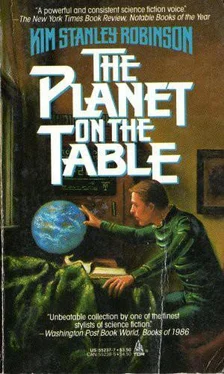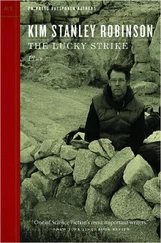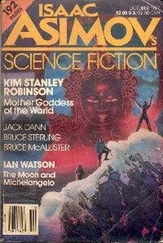With the help of Saint Anna the third mate had actually found a break in the cliffs, a quite considerable bay. Other ships of the Armada had found it as well, and they were already breaking up on a wide beach as La Lavia limped nearer shore. The keel grounded and immediately things began breaking. Soupy waves crashed over the canted midships, and Manuel leaped up the ladder to the forecastle, which was now under a tangle of rigging from the broken foremast. The mainmast went over the side, and the lee flank of the ship splintered like a match tub and flooded, right before their eyes. Among the floating timbers Manuel saw one that held a black cannonball embedded in it, undoubtedly the very one that Saint Anna had deflected from its course toward him. Reminded that she had saved his life before, Manuel grew calmer and waited for her to appear. The beach was only a few shiplengths away, scarcely visible in the thick air; like most of the men, Manuel could not swim, and he was searching with some urgency for a sight of Saint Anna when Friar Lucien appeared at his side, in his black robes. Over the shriek of the dark wind Lucien shouted, “If we hold on to a plank we’ll float ashore.”
“You go ahead,” Manuel shouted back. “I’m waiting for Saint Anna.” The friar shrugged. The wind caught his robes and Manuel saw that Lucien was attempting to save the ship’s liturgical gold, which was in the form of chains that were now wrapped around the friar’s middle. Lucien made his way to the rail and jumped over it, onto a spar that a wave was carrying away from the ship. He missed his hold on the rounded spar, however, and sank instantly.
The forecastle was now awash, and soon the foaming breakers would tear it loose from the keel. Most of the men had already left the wreck, trusting to one bit of flotsam or other. But Manuel still waited. Just as he was beginning to worry he saw the blessed grandmother of God, standing among figures on the beach that he perceived but dimly, gesturing to him. She walked out onto the white water, and he understood. “We are the Christ, of course! I will walk to shore as He once did.” He tested the surface with one shoe; it seemed a little, well, infirm, but surely it would serve—it would be like the floor of their now-demolished chapel, a sheet of water covering one of God’s good solids. So Manuel walked out onto the God’s good solids. So Manuel walked out onto the next wave that passed at the level of the forecastle, and plunged deep into the brine.
“Hey!” he spluttered as he struggled back to the surface. “Hey!” No answer from Saint Anna this time; just cold salt water. He began the laborious process of drowning, remembering as he struggled a time when he was a child, and his father had taken him down to the beach in Morocco, to see the galley of the pilgrims to Mecca rowing away. Nothing could have been less like the Irish coast than that serene, hot, tawny beach, and he and his father had gone out into the shallows to splash around in the warm water, chasing lemons. His father would toss the lemons out into the deeper water, where they bobbed just under the surface, and then Manuel would paddle out to retrieve them, laughing and choking on water.
Manuel could picture those lemons perfectly, as he snorted and coughed and thrashed to get his head back above the freezing soup one more time. Lemons bobbing in the green sea, lemons oblong and bumpy, the color of the sun when the sun is its own width above the horizon at dawn… bobbing gently just under the surface, with a knob showing here or there. Manuel pretended he was a lemon, at the same time that he tried to remember the primitive dog paddle that had gotten him around in the shallows. Arms, pushing downward. It wasn’t working. Waves tumbled him, lemonlike, in toward the strand. He bumped on the bottom and stood up. The water was only waist deep. Another wave smashed him from behind and he couldn’t find the bottom again. Not fair! he thought. His elbow ran into sand, and he twisted around and stood. Knee deep, this time. He kept an eye on the treacherous waves as they came out of the black, and trudged through them up to a beach made of coarse sand, covered by a mat of loose seaweed.
Down on the beach a distance were sailors, companions, survivors of the wrecks offshore. But there among them—soldiers on horses. English soldiers, on horses and on foot—Manuel groaned to see it—wielding swords and clubs on the exhausted men strewn across the seaweed. “No!” Manuel cried, “No!” But it was true. “Ah, God,” he said, and sank till he was sitting. Down the strand soldiers clubbed his brothers, splitting their fragile eggshell skulls so that the yolk of their brains ran into the kelp. Manuel beat his insensible fists against the sand. Filled with horror at the sight, he watched horses rear in the murk, giant and shadowy. They were coming down the beach toward him. “I’ll make myself invisible,” he decided. “Saint Anna will make me invisible.” But remembering his plan to walk on the water, he determined to help the miracle by staggering up the beach and burrowing under a particularly tall pile of seaweed. He was invisible without it, of course, but the cover of kelp would help keep him warm. Thinking such thoughts, he shivered and shivered and on the still land fell insensible as his hands.
When he woke up, the soldiers were gone. His fellows lay up and down the beach like white driftwood; ravens and wolves already converged on them. He couldn’t move very well. It took him half an hour to move his head to survey the beach, and another half hour to free himself from his pile of seaweed. And then he had to lie down again.
When he regained consciousness, he found himself behind a large log, an old piece of driftwood that had been polished silver by its years of rolling in sand. The air was clear again. He could feel it filling him and leaving him, but he could no longer see it. The sun was out; it was morning, and the storm was over. Each movement of Manuel’s body was a complete effort, a complete experience. He could see quite deeply into his skin, which appeared pickled. He had lost all of his clothes, except for a tattered shred of trousers around his middle. With all his will he made his arm move his hand, and with his stiff forefinger he touched the driftwood. He could feel it. He was still alive.
His hand fell away in the sand. The wood touched by his finger was changing, becoming a bright green spot in the surrounding silver. A thin green sprig bulged from the spot, and grew up toward the sun; leaves unfolded from this sprout as it thickened, and beneath Manuel’s fascinated gaze a bud appeared and burst open: a white rose, gleaming wetly in the white morning light.
He had managed to stand, and cover himself with kelp, and walk a full quarter of a mile inland, when he came upon people. Three of them to be exact, two men and a woman. Wilder looking people Manuel men and a woman. Wilder looking people Manuel couldn’t imagine: the men had beards that had never been cut, and arms like Laeghr’s. The woman looked exactly like his miniature portrait of Saint Anna, until she got closer and he saw that she was dirty and her teeth were broken and her skin was brindled like a dog’s belly. He had never seen such freckling before, and he stared at it, and her, every bit as much as she and her companions stared at him. He was afraid of them.
“Hide me from the English, please,” he said. At the word English the men frowned and cocked their heads. They jabbered at him in a tongue he did not know. “Help me,” he said. “I don’t know what you’re saying. Help me.” He tried Spanish and Portuguese and Sicilian and Arabic. The men were looking angry. He tried Latin, and they stepped back. “I believe in God the Father Almighty, Maker of Heaven and Earth, and in all things visible and invisible.” He laughed, a bit hysterically. “Especially invisible.” He grabbed his medallion and showed them the cross. They studied him, clearly at a loss.
Читать дальше












